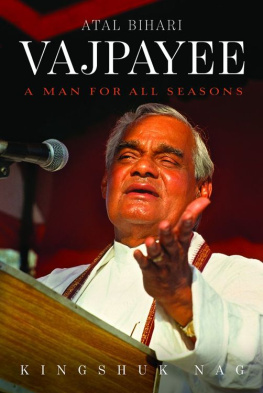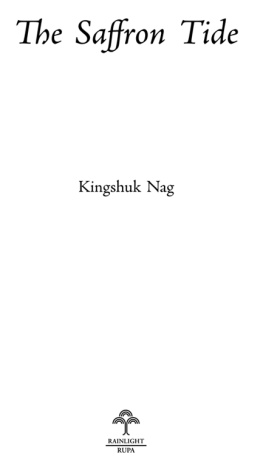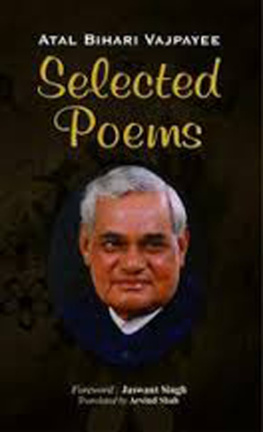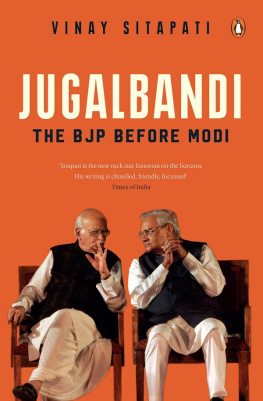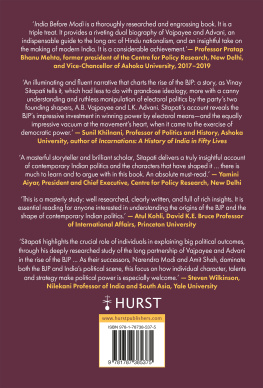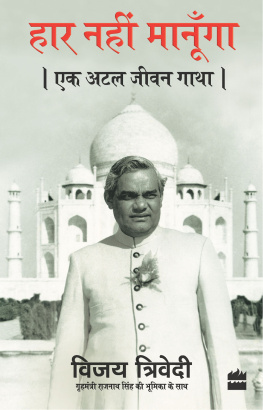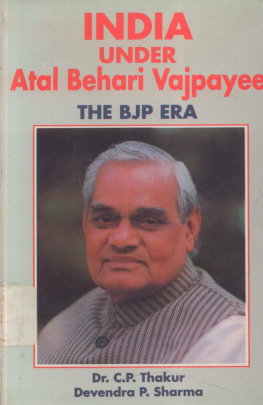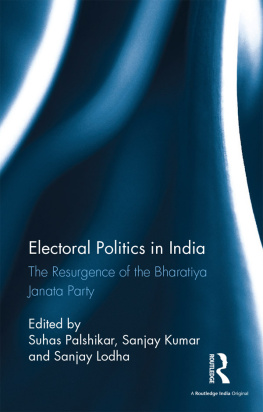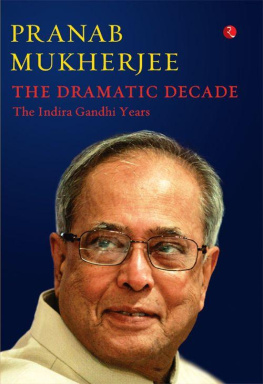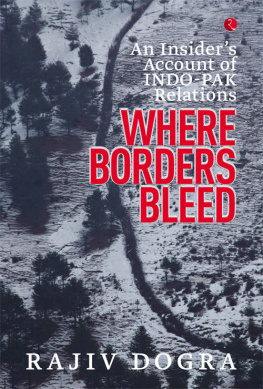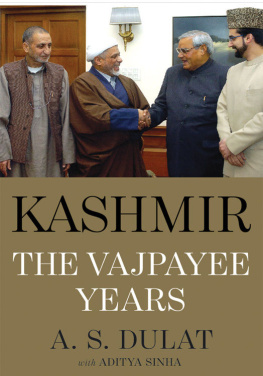ATAL BIHARI
VAJPAYEE
ATAL BIHARI
VAJPAYEE
A MAN FOR ALL SEASONS
KINGSHUK NAG

Published by
Rupa Publications India Pvt. Ltd 2016
7/16, Ansari Road, Daryaganj
New Delhi 110002
Copyright Kingshuk Nag 2016
The views and opinions expressed in this book are the authors own and the facts are as reported by him which have been verified to the extent possible, and the publishers are not in any way liable for the same.
All rights reserved.
No part of this publication may be reproduced, transmitted, or stored in a retrieval system, in any form or by any means, electronic, mechanical, photocopying, recording or otherwise, without the prior permission of the publisher.
eISBN: 978-81-291-3901-6
First impression 2016
10 9 8 7 6 5 4 3 2 1
The moral right of the author has been asserted.
This book is sold subject to the condition that it shall not, by way of trade or otherwise, be lent, resold, hired out, or otherwise circulated, without the publishers prior consent, in any form of binding or cover other than that in which it is published.
For Aman Ki Asha, the cause of peace and harmony between India and Pakistan that Atal Bihari Vajpayee tirelessly strove for.
Contents
Preface
IT WAS WHEN I was completing my book on the Bharatiya Janata PartyThe Saffron Tide: The Rise of BJPin the first quarter of 2014, that Kapish Mehra, Managing Director of Rupa Publications India, called me, asking whether I would like to write a biography of Atal Bihari Vajpayee. I pondered a while and realized that here was a man who had straddled the Indian political scene for half a century and been Prime Minister of the country, but there was no decent biography of his in English. This is what prompted me to agree to the proposal.
Writing the biography was both easy and difficult. Easy, because there are scores of people who knew Mr Vajpayee well and many of them were ready to share their experiences with me. Yet, as I proceeded with my research on him, I got the feeling that although many people said that they knew Mr Vajpayee well, he was deeper than would seem superficially. His easygoing ways were only a veneer. He was a deeply contemplative man and had a keen idea of what India needed. Even though he was from the BJP, which the Western press describes as a Hindu party, he realized that for any government to be successful in India, it had compulsorily to hold on to the middle ground. This is how it had been for centuries. It is this middle ground that Mr Vajpayee attempted to hold on to in his long political career, eschewing extremities of any kind. Thus, he became the evergreen hero of Indian politics, liked by almost everybody.
Vajpayee was not a unidimensional man: apart from politics, he took keen interest in music and was himself a poet. He was also fond of good food and, above all, of good company. This made the writing of the book an interesting project. Having lived in Delhi for a large part of my lifemost of the time in what was part of the New Delhi parliamentary constituencyAtal Bihari Vajpayee has been a familiar figure since my childhood. I can personally testify that he always evoked positive reactions in the minds of people and was seen as an eminently likeable guy. However, I regret that it was not possible to meet him for this book, owing to his ill health.
Apart from Kapish Mehra, I would like to thank the Publishing Director of Rupa, Ritu Vajpeyi-Mohan, for taking me through the project with ease. I am also thankful to my bosses at the Times of India for allowing me to undertake this project. Many peopletoo numerous to be namedwere generous with their time and some shared deep insights. I would like to thank them all.
Kingshuk Nag
Introduction
ON THE MORNING OF 1 November 1984, Atal Bihari Vajpayee heard a commotion outside his home in New Delhis Raisina Road. Although Atal was slightly indisposed, the decibel levels were loud enough to prompt the Bharatiya Janata Party (BJP) Member of Parliament (MP) to come out of his house. On the opposite side of the road was a taxi stand and a mob had collected there. The frenzied mob, charged by the assassination of Prime Minister Indira Gandhi the previous day by her Sikh bodyguards, wanted to avenge her killing by targeting every Sikh in sight. Most of the taxis at the stand, like at all other stands in Delhi, were driven by Sikhs. The mob wanted to burn the taxis and lynch the drivers. Alarmed by the sight, Atal hastened to the other side of the road to stop the violence. It took some time, but Atal was a familiar figure in Delhi and commanded enormous respect. The ringleaders heeded his words and the mob dispersed slowly. Atal stood at the spot till the last man had left.
Later in the dayafter an emergency meeting at the BJPs headquarters at 11, Ashoka Road, where he heard harrowing tales of the targeting of Sikhs from colleaguesAtal, along with longterm associate L.K. Advani, went to see Home Minister Narasimha Rao. The opposition leader was not satisfied with Raos lukewarm assurance that he would look into the problem; moreover, Rao was non-committal about deploying the army on the streets as Atal suggested. Disappointed, Atal came back to the party office and told local BJP leaders like Madan Lal Khurana and Vijay Kumar Malhotra to get the party cadres in the field to protect Sikhs and their properties. Whether the diktat was really followed by the BJP cadres or whether they stood as passive spectators at many places is a matter of debate. But the fact remains that Atal rose like a leader, trying to organize his party machinery to stop the violence while the law-and-order machinery stood inert and ruling-party-inspired mobs targeted hapless Sikhsmen, women and childrenand destroyed their properties.
A fortnight later, at the meeting of the national executive of the BJP, Atal openly said, If at some level in the ruling party this feeling had not been there that the community to which the killers [of Indira Gandhi] belonged should be taught a lesson, the disturbances would not have assumed the dimensions that they did.
For his temerity, Atal had to pay a heavy price. He had contested his previous two elections from the New Delhi constituency and realized that he would face certain defeat from his seat in the polls that were barely two months away. In fact, to ensure that Atal lost at any cost, the Congress planned to field Amitabh Bachchan from the seat. Reading the signs, he decided to move to his hometown Gwalior, but here, too, he came a cropper and lost the elections. After all, the BJP was then just a fledgling party, only four years old, and it had managed to win just two seats across the country. (Arguably, the BJPs performance could have been better in those days of madness if its party leaders had made common cause with the Congress.) In the aftermath of his mother's assassination, Rajiv Gandhi had said, When a big tree falls, the earth underneath shakes, giving courage to the marauders. Atal, on the other hand, did not make any such utterances for political gains, even though he could well have because the Sikhs, at least in those days, were not known to be part of the support base of the saffron party. As it happened, Atals silence could well have swung some of the Hindu votes towards the Congress.
Atal did not envision the BJP as a purely Hindu party. In fact, it was at his insistence that the party chose Gandhian socialism and positive secularism as its credo at its launch on the Easter Sunday of 1980. For Atal, everything that was Bharatiya was Hindu; and in his reckoning, the term Hindu did not denote the followers of Hinduism but all those who lived in Bharat that is India. Quite early in his political life, Atal realized that India was a secular country with a tradition of tolerance for all faiths. By implication, this meant that no political party could survive and prosper in the country by espousing extreme ideologies. Thus, he wanted to fashion the BJP as a centre-of-the-road party which carried everybody along with it. In doing so, he was often at cross purposes with extreme elements of the Sangh Parivar that he was a part of.
Next page
